
The Garhwal Rifles, are an infantry regiment of the Indian Army. It was originally raised in 1887 as the 39th (Garhwal) Regiment of the Bengal Army. It then became part of the British Indian Army, and after the Independence of India, it was incorporated into the Indian Army.
Colonel Chewang Rinchen MVC & Bar, SM was a highly decorated officer in the Indian Army from the Union territory of Ladakh. He was the youngest ever recipient of the Maha Vir Chakra, the second highest Indian gallantry decoration, for his role in the defence of Ladakh in the First Kashmir War. He received the Maha Vir Chakra for a second time after Indo-Pakistani War of 1971, for his role in the conquest of the Turtuk and Tyakshi, in what came to be known as the Battle of Turtuk. He was one of only six Indian service personnel to have the Maha Vir Chakra twice. He was awarded a Sena Medal for gallantry in the 1962 India-China War. and Mention in dispatches for gallantry in the Indo-Pakistani War of 1965
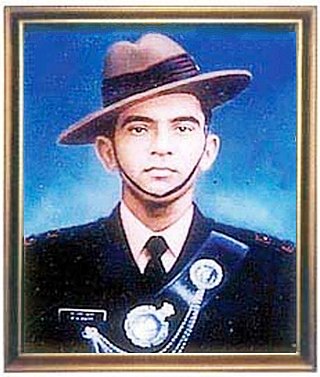
Second Lieutenant Puneet Nath Datt, AC was an officer of the Indian Army's 11 Gorkha Rifles. He was posthumously awarded India's highest peacetime gallantry award, the Ashok Chakra, for bravery displayed in an Indian Army operation. The operation was conducted against terrorists hidden in a three-story building in the Nowshera area of Srinagar, Jammu and Kashmir.
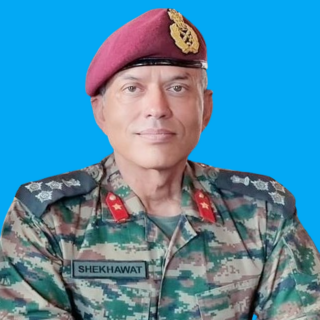
Brigadier Saurabh Singh Shekhawat, KC, SC, SM, VSM is a former Indian Army officer of the 21 Para (SF) and an avid mountaineer. He is one of Indian Army's most decorated officers, with one war-time gallantry award and two peace-time gallantry awards to his name.
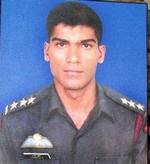
Captain Harshan Radhakrishnan Nair, AC was an officer in the Indian Army serving in the elite 2nd Battalion of the Para also known as "Predators". He was posthumously awarded the Ashoka Chakra, the country's highest peacetime gallantry award in 2008. He was killed after being shot in the thigh and neck in an encounter with Harkatul Mujahideen terrorists in the Chhoti Margi area of Lolab in Jammu and Kashmir during an operation on 20 March 2007.
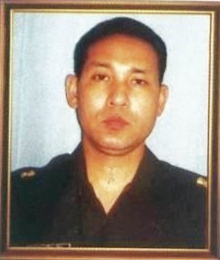
Major Laishram Jyotin Singh, AC was an Officer in the Army Medical Corps of the Indian Army, who died fighting a suicide bomber during the attack on the Indian Embassy in Kabul. Major Singh was awarded the Ashoka Chakra, the highest peacetime gallantry award in the Indian Armed Forces on 26 January, 2011.

Colonel Vasanth Venugopal, AC was an Indian Army officer. He was the commanding officer of the 9th battalion, Maratha Light Infantry. On 31 July 2007, he was Attained veergathi in action while preventing heavily armed infiltrators from crossing the India-Pakistan border at Uri, Jammu and Kashmir. As a result he was posthumously awarded the Ashoka Chakra, India's highest military decoration for peacetime gallantry.

Lieutenant Navdeep Singh Bains, AC was a Ghatak Platoon Commander of 15 Maratha Light Infantry regiment in the Indian Army.

Major Mukund Varadarajan AC was an Indian Army officer and a recipient of the Ashoka Chakra. Mukund, a commissioned officer in the Indian Army's Rajput Regiment, was posthumously awarded the Ashok Chakra for his actions during a counterterrorism operation while on deputation to the 44th Rashtriya Rifles battalion in Jammu and Kashmir. His biographical film in Tamil, Amaran, was released on the occasion of Diwali, 31 October 2024.
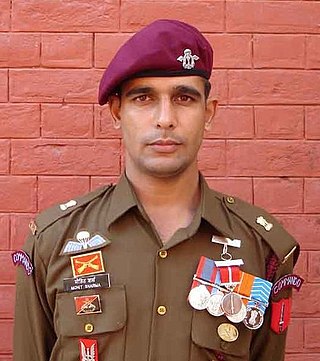
Major Mohit Sharma was an Indian Army Officer who was posthumously awarded the Ashoka Chakra, India's highest peace-time military decoration. Maj Sharma was from the elite 1st Para SF.

Colonel Jojan Thomas, AC was an Indian military officer with the Jat Regiment and later the 45 Rashtriya Rifles unit. He was a native of Kuttoor in Thiruvalla, Kerala and lived in Bangalore. He was commissioned from the Officers Training Academy, Chennai in March 1986. On 22 August 2008, he led an operation against terrorists in the forests of Macchal sector in the Kupwara district of Jammu and Kashmir. In the process, he killed three terrorists, but sustained several gunshot wounds and succumbed to injuries. For his bravery, he was posthumously awarded the Ashoka Chakra, the highest peace time military decoration in India.

Major Dinesh Raghu Raman, AC was an Indian military officer with the 19th Battalion of the Jat Regiment who was posthumously awarded India's highest peacetime military decoration Ashoka Chakra.
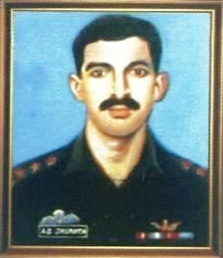
Captain Arun Singh Jasrotia, AC, SM was an Indian military officer in the 9 Para. He was posthumously awarded the Ashoka Chakra, the highest peace time military decoration in India. He was also recipient of Sena Medal.

Naik Neeraj Kumar Singh, AC was a Non Commissioned Officer (NCO) in the Indian Army who was posthumously awarded the Ashok Chakra, the country’s highest peacetime military decoration on 26 January 2015. He had enlisted in the 13th battalion, Rajputana Rifles and was serving in the 57th battalion Rashtriya Rifles when he was killed in action.

Major General Cyrus Addie Pithawalla AC, VSM, is a former General officer of the Indian Army. He was awarded India's highest peacetime decoration for gallantry, the Ashok Chakra, in 1981, and by virtue of this is one of the most decorated flag officers in the history of the Indian Armed Forces.

Harsh Udai Singh Gaur was an Indian military officer posted as commanding officer of 10 Bihar Regiment.
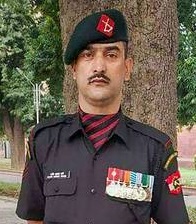
Lance Naik Nazir Ahmad Wani, AC, SM & Bar was an Indian Army soldier and a recipient of the Ashoka Chakra, India's highest peacetime military decoration. At the time of his death, he was serving with an auxiliary battalion of the army's Jammu and Kashmir Light Infantry Regiment, the 162nd Infantry Battalion of the Territorial Army. He was posthumously awarded the Ashoka Chakra for his actions during a counterterrorism operation in which his unit was attached with the 34th Rashtriya Rifles battalion. He was the first recipient of the Ashok Chakra from Jammu and Kashmir.

Captain Sandeep Shankla was an Indian Army officer who was posthumously awarded India's highest peacetime gallantry award, the Ashoka Chakra, for acts in Jammu and Kashmir.

Lieutenant Ram Prakash Roperia, AC was an Indian Army officer who was awarded India's highest peace time military decoration Ashoka Chakra for his gallant act in Operation Blue Star.

Colonel Manpreet Singh, KC, SM was a decorated Indian Army Officer. He was killed in action during an operation in Anantnag with three others security personnel. For his bravery in the action he was awarded India's second highest peacetime gallantry award the Kirti Chakra posthumously, previously he was also conferred with Sena Medal gallantry.



















